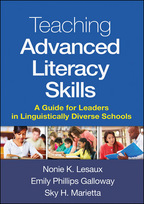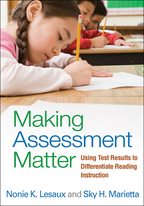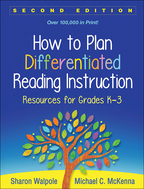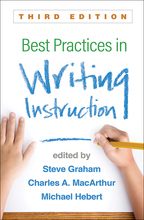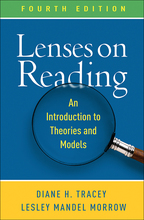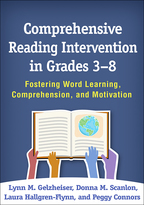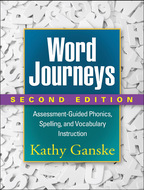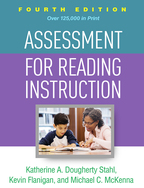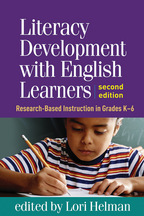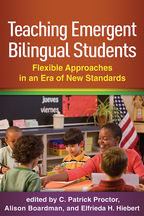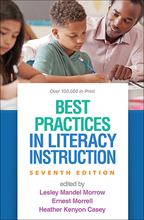Teaching Advanced Literacy Skills
A Guide for Leaders in Linguistically Diverse Schools
Nonie K. Lesaux, Emily Phillips Galloway, and Sky H. Marietta
HardcoverPaperbacke-bookprint + e-book
Hardcover
orderAugust 1, 2016
ISBN 9781462526475
Price: $54.00 196 Pages
Size: 7" x 10"
Paperback
orderAugust 2, 2016
ISBN 9781462526468
Price: $36.00196 Pages
Size: 7" x 10"
The reproducible materials can be downloaded and printed in PDF format.
“This text is well structured to support the implementation of advanced literacies curriculum and practices….Readers will welcome the authors’ direct approach to a complex endeavor. Particular features make the book a rich, yet readily accessible reference, for example, the figures and charts that summarize key ideas. In addition, the book concludes with a practical Appendix titled ‘A Leader’s Compendium of Tools’ that provides reproducible guides for implementing and monitoring the key shifts that are the focus of the book….Teaching Advanced Literacy Skills is a refreshing and timely contribution to the literatures on literacy education and school leadership. Lesaux, Galloway, and Marietta are unswerving in their mission to promote advanced literacies for all students in our increasingly diverse nation. They expertly synthesize the latest academic research and present a comprehensive, informed guide for creating coherent and sustained literacy reform. School leaders would do well to share the ideas in this book with their faculty to gain their support as they embark on a journey toward teaching students advanced literacies. For schools already on this journey, this book provides a sound framework for checking progress and moving forward. In summary, Lesaux, Galloway, and Marietta’s text is an excellent guide for school leaders who are not simply focused on students’ short-term gains, but rather, on the long-term capacities required for success in the 21st century.”

—Journal of Education
“This book has one foot anchored in current literacy research and theory and the other solidly grounded in the realities of classroom practice in today's schools. Lesaux, Galloway, and Marietta provide teachers, teacher educators, and researchers with a useful, valid framework for making important decisions about the particular pedagogical and curricular pathways that individual students should travel on their journey toward competence and confidence as readers and writers. The book gives special prominence to English language learners, the population that provides the most vexing challenge to our educational system. It will help teachers employ the considerable resources that all students bring to the classroom while developing plans to meet their considerable needs—one child at a time.”

—P. David Pearson, PhD, Evelyn Lois Corey Professor Emeritus ofInstructional Science, University of California, Berkeley
“A compelling call to action, this book shows that increasing students' literacy competencies is dependent not on more assessment, but rather on using assessment appropriately to strengthen the instructional core. The authors describe the hallmarks of advanced literacy and articulate four key shifts, including a model of professional development that reflects sustained collaborative learning. Presenting relevant research and a 21st-century definition of advanced literacy, the book offers a blueprint and practical tools for strengthening professional learning practices and instruction in classrooms and across schools. This is a 'must read' for educators committed to supporting success for all learners.”

—Ann Iparraguirre, EdD, ELL Instructional Lead (Manhattan), New York City Public Schools
“This is an essential, comprehensive work for educators seeking to effect change to core literacy instruction in order to diminish the need for widespread intervention. It describes strategies that can benefit the entire school community and shows how to avoid common pitfalls of reform efforts. In this time of high standards, the book provides specific guidance for advanced literacy instruction for linguistically diverse students. A brilliant how-to resource!”

—Angelica M. Infante, MA, former CEO, Office of English Language Learners, New York City Department of Education
—Journal of Education
“This book has one foot anchored in current literacy research and theory and the other solidly grounded in the realities of classroom practice in today's schools. Lesaux, Galloway, and Marietta provide teachers, teacher educators, and researchers with a useful, valid framework for making important decisions about the particular pedagogical and curricular pathways that individual students should travel on their journey toward competence and confidence as readers and writers. The book gives special prominence to English language learners, the population that provides the most vexing challenge to our educational system. It will help teachers employ the considerable resources that all students bring to the classroom while developing plans to meet their considerable needs—one child at a time.”
—P. David Pearson, PhD, Evelyn Lois Corey Professor Emeritus ofInstructional Science, University of California, Berkeley
“A compelling call to action, this book shows that increasing students' literacy competencies is dependent not on more assessment, but rather on using assessment appropriately to strengthen the instructional core. The authors describe the hallmarks of advanced literacy and articulate four key shifts, including a model of professional development that reflects sustained collaborative learning. Presenting relevant research and a 21st-century definition of advanced literacy, the book offers a blueprint and practical tools for strengthening professional learning practices and instruction in classrooms and across schools. This is a 'must read' for educators committed to supporting success for all learners.”
—Ann Iparraguirre, EdD, ELL Instructional Lead (Manhattan), New York City Public Schools
“This is an essential, comprehensive work for educators seeking to effect change to core literacy instruction in order to diminish the need for widespread intervention. It describes strategies that can benefit the entire school community and shows how to avoid common pitfalls of reform efforts. In this time of high standards, the book provides specific guidance for advanced literacy instruction for linguistically diverse students. A brilliant how-to resource!”
—Angelica M. Infante, MA, former CEO, Office of English Language Learners, New York City Department of Education

